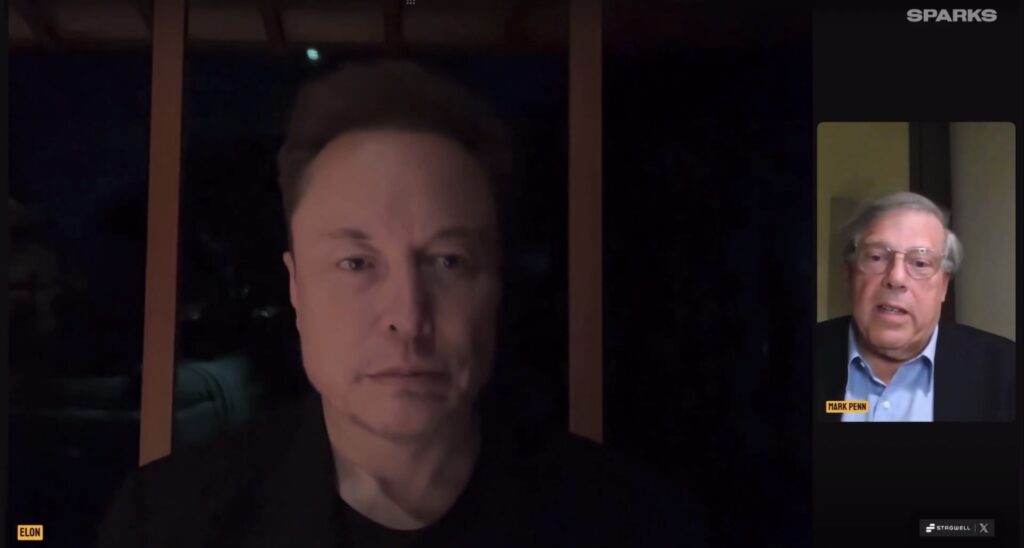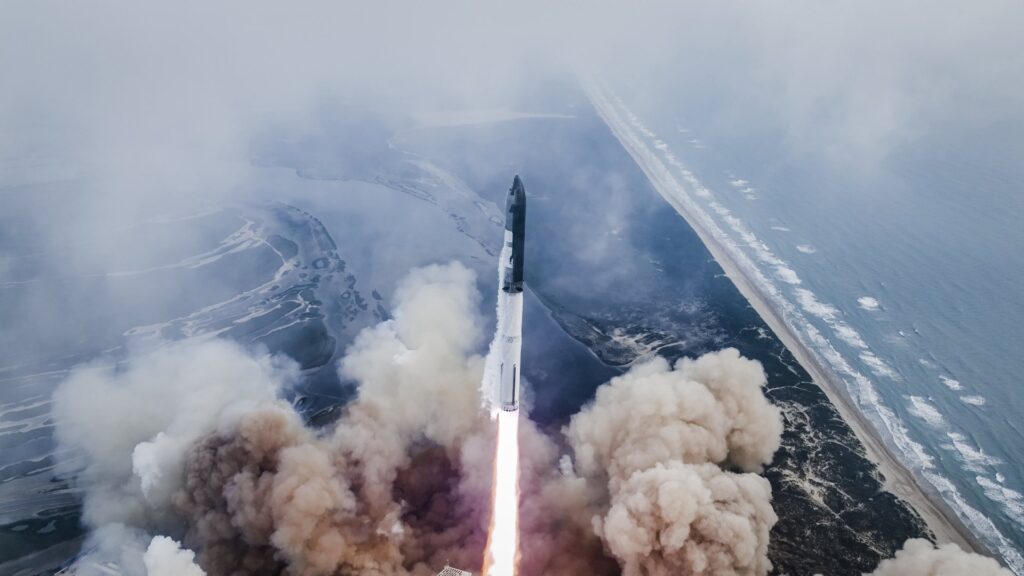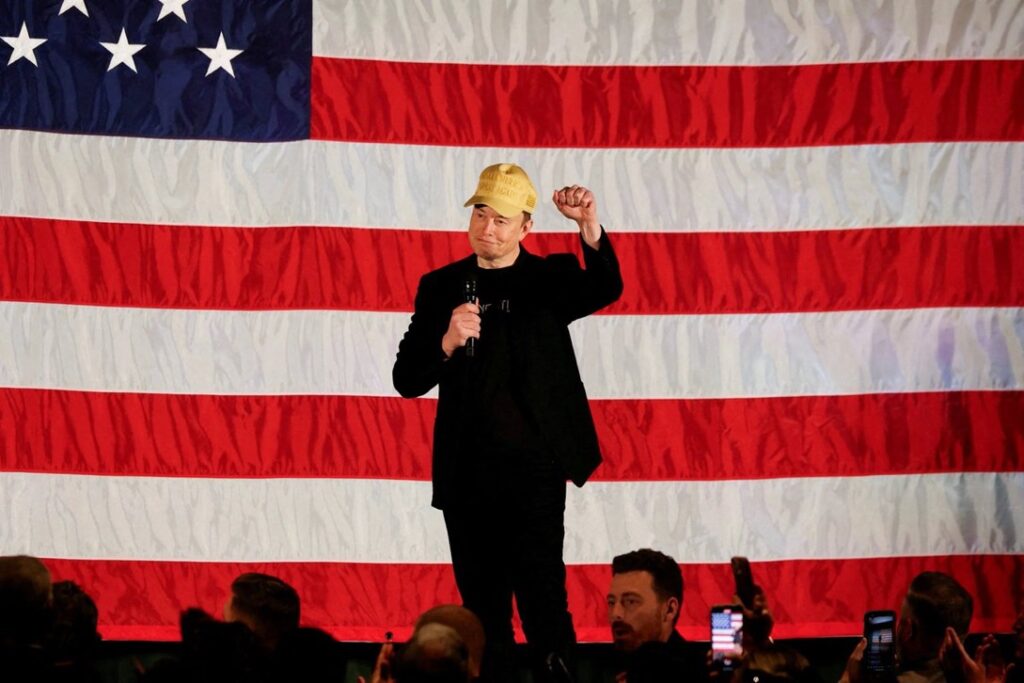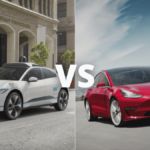Elon Musk drops Bombshells in Interview with Stagwell’s CEO Mark Penn
In a recent interview on X with Mark Penn, Elon Musk shared his bold predictions and insights into the future of Tesla, artificial intelligence (AI), robotics, and space exploration. As always, Musk didn’t shy away from making ambitious statements about how these technologies will transform our lives. From autonomous vehicles to humanoid robots and colonizing Mars, Musk’s vision is both inspiring and provocative. Here’s an in depth look at what he shared.

Artificial Intelligence: A Cognitive Revolution
According to Musk, AI is on the verge of reshaping every aspect of human life. Within just a few years, AI will be capable of performing any cognitive task that doesn’t involve physical interaction with the world. Tasks ranging from diagnosing illnesses to creating art will soon be done more efficiently and accurately by AI than by humans.
Perhaps most striking is Musk’s assertion that the cumulative knowledge of humanity every book, article, and video ever created has already been used to train AI systems. This milestone, reached last year, has forced researchers to rely on synthetic data, where AI generates its own scenarios and learns from them. However, this raises challenges, such as ensuring that the AI doesn’t generate inaccurate or misleading information.
The implications are staggering. As AI becomes increasingly capable, its influence will permeate industries, from healthcare to education, and even creative fields. Musk predicts that within five years, it will be impossible to imagine daily life without AI.
Self-Driving Cars: Safer and Smarter
Tesla’s advancements in autonomous driving technology are a cornerstone of Musk’s vision. The company’s self-driving software, powered purely by AI and vision-based systems, is improving at an exponential rate. Musk believes that Tesla’s autonomous vehicles will surpass the safety of an average experienced human driver within a matter of months.
Unlike competitors relying on expensive sensors like LIDAR, Tesla’s approach is more flexible and scalable. The system can operate in unfamiliar locations and even hypothetical environments, such as an alien planet, without prior mapping.
The broader implications extend beyond individual convenience. Once autonomous driving is widely adopted, the number of traffic accidents currently one of the leading causes of death worldwide could be drastically reduced. Musk envisions a future where self-driving cars are up to 100 times safer than human drivers, marking a paradigm shift in transportation.
Humanoid Robots: The Largest Market in History
While self-driving cars represent one frontier, humanoid robots are the next. Tesla’s humanoid robot, Optimus, is currently being tested in Tesla factories, where it performs basic tasks. Musk calls Optimus the most advanced humanoid robot in existence, with human-like hands capable of delicate tasks.
Musk foresees a future where robots outnumber humans by three, four, or even five to one. Tesla plans to scale production rapidly, starting with thousands of robots in 2025 and growing to millions within a few years. These robots won’t just revolutionize manufacturing but will also become a staple in homes and workplaces. From household chores to industrial labor, humanoid robots will redefine the concept of work and productivity.
The economic implications are equally profound. As robots take over physical and cognitive labor, Musk envisions a world of “universal high income,” where the wealth created by automation allows for a higher standard of living for everyone.
Mars: A Self-Sustaining Civilization

Elon Musk’s vision for Mars extends beyond exploration to the very survival of humanity. He imagines a future where Mars becomes self-sustaining.A civilization capable of thriving even if Earth can no longer provide support. This milestone, Musk argues, is critical for ensuring humanity’s survival in the face of catastrophic events, such as global conflicts or natural disasters.
A significant step in this journey is perfecting the technology to safely land on Mars. Musk humorously remarked, “We need to land on Mars without increasing the crater count.” This underscores the immense challenge of ensuring precise and controlled landings on the Red Planet. Each successful landing represents a crucial step toward establishing the infrastructure needed for a self-reliant colony.
The ultimate goal, as Musk puts it, is to evolve from a “lame one planet civilization” into a respectable multi planetary species. He envisions the awe inspiring sight of thousands of Starships departing Earth, forming bright points of light in space as they make their way to Mars. But beyond the spectacle, the mission remains clear: to create a thriving, self reliant society on Mars capable of securing the future of human civilization.
The journey to Mars is filled with technical, logistical, and environmental hurdles, but Musk’s focus on minimizing risk both in landing spacecraft and ensuring sustainability highlights his determination to turn this ambitious dream into reality.
Neuralink: Bridging Brain and Technology
Musk also shared updates on Neuralink, his company focused on brain computer interfaces. Neuralink has already implanted devices in three human patients with positive results, and the company plans to expand trials to 20 30 patients this year. These devices, now upgraded with more electrodes and longer battery life, are designed to help people regain lost motor functions.
The first applications include enabling tetraplegics and paraplegics to control computers or phones purely through thought. Neuralink also aims to restore vision for the blind, even for those born without sight, by directly interfacing with the brain’s visual cortex.
In the long term, Neuralink could revolutionize human communication by increasing bandwidth between our thoughts and external devices, making us “superhuman” in cognitive capabilities. Musk believes this could multiply human output by a thousand or even a million times, fundamentally changing how we interact with the world.
Government Efficiency and Budget Reform

Musk didn’t hold back in criticizing government inefficiencies, calling the current system a “target rich environment for saving money.” He highlighted the wasteful practice of forcing departments to spend their full budget to avoid cuts, even on unnecessary projects.
He also pointed out how regulatory bloat has made infrastructure projects far more expensive and slower than they were in the past. For example, modern projects don’t match the value of historical achievements like the Brooklyn Bridge, even after adjusting for inflation. Musk advocates for removing outdated and harmful regulations to improve efficiency and deliver better results for the public.
Free Speech in the Digital Age
Musk has been an outspoken advocate for free speech, which he sees as a cornerstone of democracy. He reflected on how legacy media once served as an essential aggregation point for information. In the pre-Internet era, news was slow to travel, sometimes taking weeks or months to reach distant regions.
The Internet has changed everything, empowering citizen journalism and enabling real-time reporting, especially during crises like wildfires. Musk highlighted the importance of platforms that allow individuals to share information directly, bypassing traditional gatekeepers. He believes that these tools are critical for maintaining transparency and ensuring that democracy thrives.
At the same time, Musk criticized past practices of censorship, such as those revealed in the Twitter Files, where government agencies had direct access to control information. For Musk, preserving free speech is vital for informed decision-making and a functioning society.
The Bigger Picture
Elon Musk’s vision encompasses a profound transformation of humanity’s future. From colonizing Mars to integrating technology with the human brain and reshaping governance, his ideas push the boundaries of what is possible. At the same time, he remains deeply committed to foundational principles like free speech, which he sees as essential for a transparent and democratic society.
As Musk continues to innovate across industries, his work serves as a reminder that technology isn’t just about progress it’s about redefining what it means to be human.


